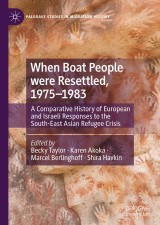Details

When Boat People were Resettled, 1975-1983
A Comparative History of European and Israeli Responses to the South-East Asian Refugee CrisisPalgrave Studies in Migration History
|
106,99 € |
|
| Verlag: | Palgrave Macmillan |
| Format: | |
| Veröffentl.: | 21.06.2021 |
| ISBN/EAN: | 9783030642242 |
| Sprache: | englisch |
Dieses eBook enthält ein Wasserzeichen.
Beschreibungen
<div>This book traces the reception and resettlement of Vietnamese, Cambodians and Laotians in France, Germany, the United Kingdom, the Netherlands and Israel during the 'boat people' crisis of 1975–79. These years saw hundreds of thousands of people displaced by the emergence of the Socialist Republic of Vietnam and political instability across south-east Asia. Using a comparative historical approach, the authors demonstrate the multiple ways in which refugees were contested, accepted, received and resettled across different national contexts. This episode is held up today as an example of European generosity. Yet this book illustrates how the reception of boat people in Western Europe and Israel was shaped by the Cold War, and by specific national preoccupations over international prestige, immigration, labour supply and the place of foreign-born strangers in their increasingly diverse societies. While the post-2015 refugee crisis in Europe has often been construed as a new challenge requiring an unprecedented coordinated international response, this book shows the longer history of such dilemmas.</div><div><br></div><div>Chapter 4 is available open access under a Creative Commons Attribution 4.0 International License via link.springer.com.<br></div>
1. Introduction.- 2. France: ‘Boat people’ brought by plane - Karen Akoka.- 3. Germany: ‘Refugie-surprise’: The unlikely reception of Indochinese boat-people in Germany - Marcel Berlinghoff.- 4. Britain: ‘Our most foreign refugees’: refugees from Vietnam in Britain - Becky Taylor.- 5. The Netherlands: ‘Boat people’ as changemakers in the Dutch refugee system - Julia Kleinschmidt.- 6. Israel: Asylum without refugee status: Israel’s reception of Vietnamese exiles.- 7. Bibliography.
<div><b>Becky Taylor</b> is Professor of Modern History at the University of East Anglia, UK. </div><div><br></div><div><b>Karen Akoka </b>is an Associate Professor in Political Science, Paris Nanterre University, France, a researcher at the Institut des Sciences Sociales du Politique and a Fellow of the Institut Convergences Migrations.<b> </b><br></div><div><br></div><div><b>Marcel Berlinghoff </b>is a senior researcher and member of the Institute for Migration Research and Intercultural Studies (IMIS), Osnabrueck University, Germany<b> </b></div><div><b><br></b></div><div><b>Shira Havkin</b> is an affiliated researcher at Sciences-Po CERI, France, and a fellow of the Institut Convergences Migrations.<br></div><div><br></div><div><br></div>
<div>This book traces the reception and resettlement of Vietnamese, Cambodians and Laotians in France, Germany, the United Kingdom, the Netherlands and Israel during the 'boat people' crisis of 1975–79. These years saw hundreds of thousands of people displaced by the emergence of the Socialist Republic of Vietnam and political instability across south-east Asia. Using a comparative historical approach, the authors demonstrate the multiple ways in which refugees were contested, accepted, received and resettled across different national contexts. This episode is held up today as an example of European generosity. Yet this book illustrates how the reception of boat people in Western Europe and Israel was shaped by the Cold War, and by specific national preoccupations over international prestige, immigration, labour supply and the place of foreign-born strangers in their increasingly diverse societies. While the post-2015 refugee crisis in Europe has often been construed as a new challenge requiring an unprecedented coordinated international response, this book shows the longer history of such dilemmas.</div><div><br></div><div>Chapter 4 is available open access under a Creative Commons Attribution 4.0 International License via link.springer.com.</div>
Offers a comparative account of how the United Kingdom, France, Germany, the Netherlands and Israel responded to the Southeast Asian refugee crisis of 1979 Unpicks the different factors underpinning each European nation’s agreement to accept ‘boat-people’ from Southeast Asia and their very different treatment post-resettlement Provides insights into policies specific to individual countries, while revealing pan-European trends during a critical period of political and social change

















